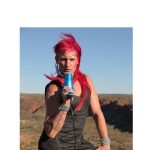At the Frontline of Gender Activism: An Interview with Norrie

The rights of transgender and gender diverse people have come a long way over the last decades. Now, high-profile trans celebrities like Laverne Cox and Australian model Andrej Pejić have moved into the spotlight, while Cate McGregor is a high-ranking officer in the Australian Defence Force.
A recent South Australian development has allowed transgender and intersex public school students to participate in all aspects of school life in the capacity of the gender they identify as.
However, recently in the US, some of those rights have been whittled away.
North Carolina passed the bathroom bill last year, which requires individuals to use the bathroom that corresponds to their birth certificate in government buildings. And Trump has just revoked the Obama administration’s guidelines designed to ensure the fair treatment of trans students at schools.
Indeed, transphobic discrimination and violence still continues to occur around the globe.
Androgyny activism
Norrie is someone who has been at the forefront of gender activism since the late 1980s. In 2014, they won a four year legal battle to have their sex registered as “non-specific” at the NSW Registry of Births, Deaths and Marriages, when the High Court of Australia ruled in their favour.
Back in 2009, Norrie applied to have their sex registered as non-specific at the registry. As required, they provided the statutory declarations of two medical practitioners. And these doctors said they supported that their sex should be registered as non-specific.
The application was approved in February 2010, and certificates were issued. However, four months later, the government agency wrote back stating that they had “issued an error.”
So Norrie took the matter to the NSW Civil and Administrative Tribunal (NCAT). However, the Tribunal rule that the NSW Births Deaths and Marriages Registration Act 1995 (BDMR Act) “is predicated on an assumption that all people can be classified” as male or female.
But, Norrie understood the legislation did allow for an individual to be registered as indeterminate sex. And through subsequent appeals, Norrie found that the highest court in the land agreed with them.
Ending transgender vilification
The High Court decision wasn’t Norrie’s first victory in the realm of gender rights. In the early 1990s, they were involved in establishing the Transgender Lobby Coalition, which campaigned for transgender discrimination to be made illegal.
In June 1996, the Transgender (Anti-Discrimination and Other Acts Amendment) Act was passed through NSW state parliament. The act amended the NSW Anti-Discrimination Act 1977 to make discrimination and vilification on transgender grounds unlawful.
It also amended the BDMR Act to provide for the recognition of a change of sex. This can be now done under certain conditions, including having undergone sex reassignment surgery and not being married.
Sydney Criminal Lawyers® spoke with Norrie about their life at the leading edge of Australian gender activism and the impact that their High Court decision and the Transgender Act have had upon gender diverse rights in this country.
In the early 1990s, you were involved in establishing the Transgender Lobby Coalition.
Can you tell us about who you were? What you were fighting for? And what the battle was like at that point in time for transgender people?
It was so horrible for transgender people at that time. I was involved with the management committee of what was then Tiresias House, which is now the Gender Centre. Back then they were a refuge for transgender people.
We saw the people who were really done over by the system particularly that ended up in the so-called criminal justice system – which is more criminal, than justice – where they can’t accommodate trans people.
Because you put a girly tranny in with the boys, and you’re not going to get good results. And then sometimes the prison officials don’t like putting them in with the women, because that means accepting what the trans person says about themselves.
And when you’re trying to criminalise someone, and dehumanise them, you’re not going to take their word for it. You’re going to say everything they say about themselves is false. That’s the way they oppress you.
We ended up with trans people that couldn’t be accommodated.
Say they held up a bank for some reason. They wanted some money for their surgery or whatever. They ended up in trouble with the law. They got locked up and then there was nowhere to put them on parole, for example.
That’s how the transgender refuges got funded, because there was people there was no space for.
They couldn’t go into women’s refuges. They weren’t suitable in men’s refuges. The government finally said, “OK, we’ll have a special trans refuge.”
You were involved in campaigning for the Transgender Act. Twenty years on, what do you think has been the impact of that act?
Primarily, it’s allowed people who are transgender to get on with their lives in the same way everyone else does, without discrimination in employment or housing.
So I think the major impact is that transgender people are allowed to do the same things that everyone else does: work, have a home to go to, pay taxes.
So that’s the major impact. There’s been a bit of a minor impact for people like me who identify as not being strictly male or female. That don’t really see how the binary applies to mammals.
Frankly, you’ve all got nipples and uteruses. But that’s beside the point, apparently.
I identify as androgynous. And I don’t want to be slammed with male or female. The law said that. We did a High Court case proving that, because every time we’d say, “The law says we’re allowed to do this,” the officials go, “Oh, but it hasn’t been done before.”
So even though the law was clear we had to push the point in the High Court. So the High Court said, “No, actually the law was made twenty years ago. It does allow for people of indeterminate sex, or it does allow for ambiguities.”
So the law that was laid down twenty years ago, laid the foundation for people to be who they are without having to say, “I’m completely male,” or, “I’m completely female.”
Due to those amendments, the Anti-Discrimination Act provides that it’s unlawful to discriminate against a person on transgender grounds in regards to accommodation. However, some transgender people report they have difficulties in finding accommodation today.
How effective do you think this provision of the legislation has been?
I think it’s been fairly effective.
I mean, in our housing system we marginalise people. And maybe some people end up with behavioural problems, where it’s hard for them to have accommodation. You know, if you’re burning it down, or knocking a hole through to the neighbour’s, there’s a problem.
Well, us transgender people, most of us, are like everyone else, as boring as they are. Some of us though, are as fabulous as Priscilla, Queen of the Desert, and some of us are psychopaths like the axe murderer of Stanmore.
So from the best to the worst, most of us are completely boring. But the standouts are either very good or very bad.
So after NCAT ruled that it wasn’t possible for you to be registered as “non-specific” sex, you appealed the tribunal’s decision in the NSW Court of Appeal. What was the outcome of that case?
That upheld my side and ruled that we were allowed to register me as sex non-specific or unspecified.
So the Registrar took it to the High Court.
No the Registrar, first of all, appealed to the Supreme Court and we won. In the Supreme Court of NSW.
Then the Registrar appealed against that to the High Court. The High Court, sitting in Sydney, granted them leave to appeal, but said they have to pay my costs.
So they said, “Yes, we’ll hear the case in the High Court. But we reckon the Supreme Court of NSW have got it so right, we’re just going to dot the i’s if you really want us to. But you guys are paying for it.”
So that was the deal. Then we went to Canberra. And the High Court said, “Yeah, the Supreme Court got it right. And you guys are paying all the money.”
Your argument was based around section 32A of the BDMR Act. Can you outline what your argument was regarding this section that won you the court case?
There’s a phrase there that says that people have surgery either to change them from one sex to the other, or to eliminate or remove ambiguities. That phrase recognises that there can be a state that is ambiguous.
So perhaps you could change from being totally ambiguous to being completely male, or completely female. Or it’s partially correct that you could change from being a bit in-between to still a bit in-between in a different way.
Or you could say you want to remove ambiguity about you being androgynous, so you make sure that you become more particularly androgynous, which is arguably the result of transgender surgery.
It doesn’t really change biology. They don’t put ovaries in instead of testes. What they do is they remove the biological sex – OK that’s the biologist in me speaking.
I’m the same sex as everyone’s pet, so I don’t see what the big deal is.
So Norrie, it’s been three years since your victory in the High Court of Australia. What would you say the repercussions of the ruling have been?
The idea that you could exist as a human being without having to say, “I’m a normal man,” or, “I’m a normal woman,” that idea gave people permission to identify in other ways.
I think there was an American, Jamie Shupe, who got their drivers licence with X in Oregon. And I saw recently, someone else claimed to be the first person to have X.
Everyone said I was the first, but then the intersex people popped up and said there was an Alex MacFarlane who had unspecified on their documents a couple of years before me. The moment you say you’re the first, other people say, “No. It was me.”
But, I was the first to do it in a court.
The amendments made by the Transgender Act don’t allow for someone to change their sex on their birth certificate – even if they’ve undergone a sex affirmation procedure – if they’re married. Many have been pushing to change this.
What do you think about this still being the case today?
It’s a terrible thing to do. To tell people that their relationship must conform to some bureaucrats idea of what’s acceptable. It’s against family values. It’s breaking up families if someone has to divorce their partner, so they can get a passport to travel safely on that matches how they look.
How is that family values? That’s anti-family values.
And do you think that’s got something to do with the fact that the government still won’t allow same-sex marriage?
I think that’s part of their huge hang up. I knew a case of a couple that were married as heterosexual under British law, because one of them was female on their birth certificate, and the other was male on their birth certificate.
They were both for all intents and purposes female. So the one that had male on their birth certificate had since had surgery to become female. And the Australian law looked at them and said, “Oh no, you’re two women. We can’t recognise you as married.”
So they agreed to be called “in an interdependent lesbian relationship,” so that they could come into Australia, despite the fact, that legally they had been heterosexually married.
But they looked a bit like a same-sex couple, so the Howard government freaked out and effectively dissolved their marriage.
How is that pro-family? How is that pro-marriage?
And then another issue under the current law is that transgender people, who don’t undergo sex reassignment procedures, are still not allowed to register their change of sex.
What do you think about the government’s focus on having to undergo a surgical procedure to do that?
They’re getting a bit less sticky about it. I understand with passports that you don’t need to have surgery, it’s a matter of identification. It’s a matter of who you are is who you say you are. Because who knows that better than you? The best way of figuring out someone’s gender identity is to ask them.
And so you can with passports. And there’s different conditions for different states. Because birth certificates are a state matter and different states have made different determinations.
I would hope that things would move in favour of people’s identity documents matching who they are, which is who they say they are. The person that they take all the trouble to make themselves up as every day. Whether they grow a beard, or shave their armpits, we’re all manufacturing our gender.
But you shouldn’t be forced to have documents that contrast with who you are.
Last week, it was reported that non-binary and gender-diverse university students around the country who receive youth allowance payments have been warned these payments might be cut off, as Centrelink’s internal system only allows for male and female.
This disruption is occurring as university enrolment forms allow students to provide a third option. Obviously, your High Court decision has had an impact on university enrolment forms, but not on government data systems.
Do you think this sort of situation will change anytime soon?
This is dreadful. In actual fact, in 2011, Kevin Rudd, when he was minister for immigration and citizenship, he changed the rules, so that we could have X on our Australian passports.
This was before my High Court case. So in 2011, Kevin Rudd gave us that. And he said that federal government departments had to change their systems. They had until 2016 to comply.
So the federal government said, “OK, we’re recognising X. And every department is going to have X in their computer systems within five years.” That’s a fair amount of time, five years. That’s not a rush.
However, that five years was up last year, 2016. Why are we still facing this incompetence? Really, somebody should be going down a pay grade, or being shuffled to somewhere. They need someone competent.
It doesn’t take a lot to alter a field from having two variables to having three or more. It’s not computer science. It’s so basic.
And lastly, Norrie, gender rights have come a long way over recent years.
What direction do you think the next to push forward has to be in order to ensure greater rights for LGBTIQ people around the world?
Sometimes it’s two steps forward and two steps back. We have to keep the pressure on, because even if we have marriage equality in Australia, we still have to do something about the fact that gay people get walls pushed on them in Saudi Arabia.
Indonesia just arrested a gay couple for being in love with each other. Neighbours found out they were gay. They bashed down the bedroom doors, caught them naked together and they’re now getting prosecuted. So this is our next door neighbours.
We have to be active, so that we uphold human rights for all human beings.
Norrie thanks for taking the time out today for this intriguing interview. And best of luck with your gender activism into the future.
Cheers. Thanks Paul.
Photo Credit: Nicole Verges.







